外研版(2019)选择性必修第三册Unit 5 Learning from Nature Developing ideas Reading 课件(共22张PPT)
文档属性
| 名称 | 外研版(2019)选择性必修第三册Unit 5 Learning from Nature Developing ideas Reading 课件(共22张PPT) | 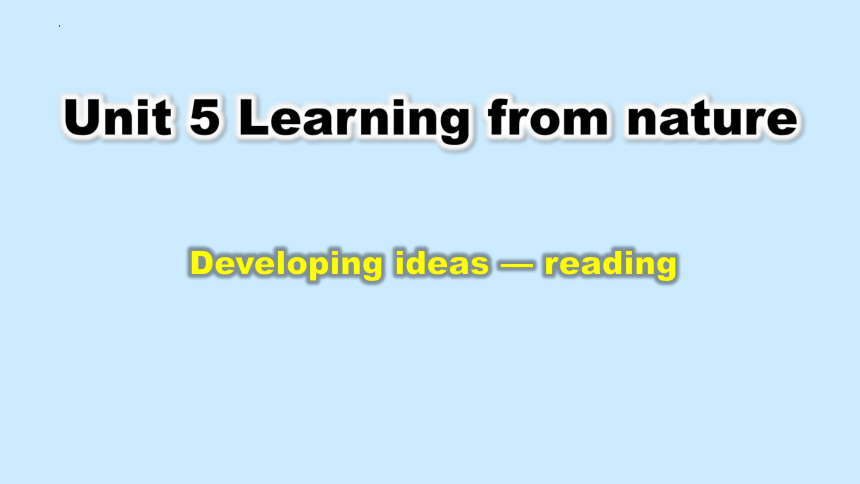 | |
| 格式 | pptx | ||
| 文件大小 | 1.7MB | ||
| 资源类型 | 教案 | ||
| 版本资源 | 外研版(2019) | ||
| 科目 | 英语 | ||
| 更新时间 | 2024-05-14 12:29:56 | ||
图片预览

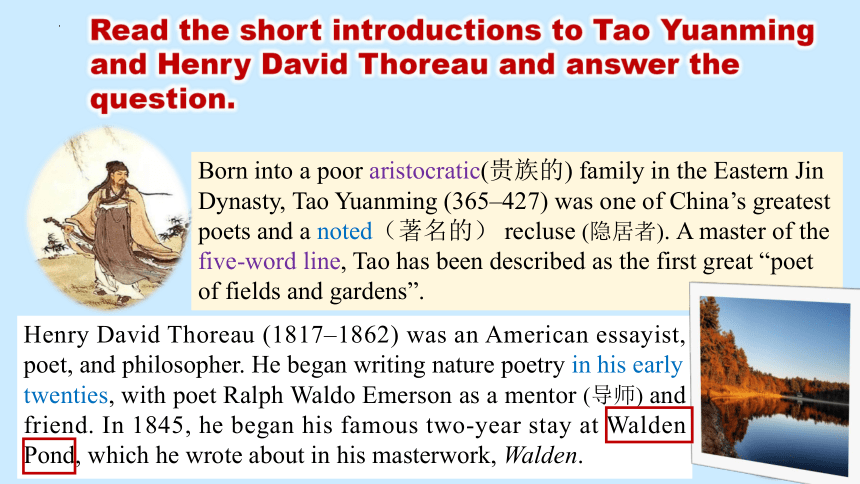
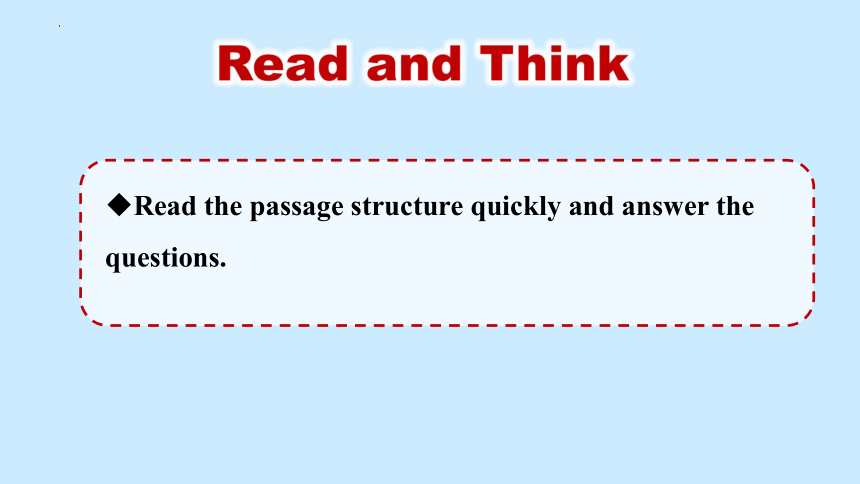
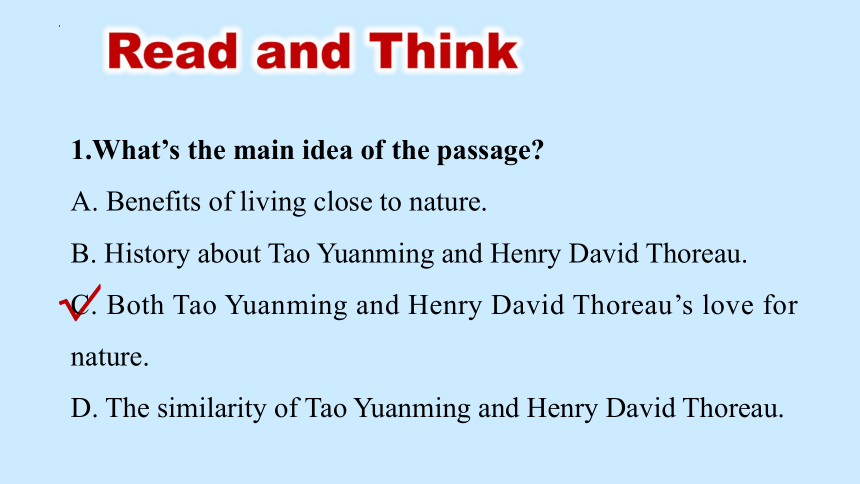
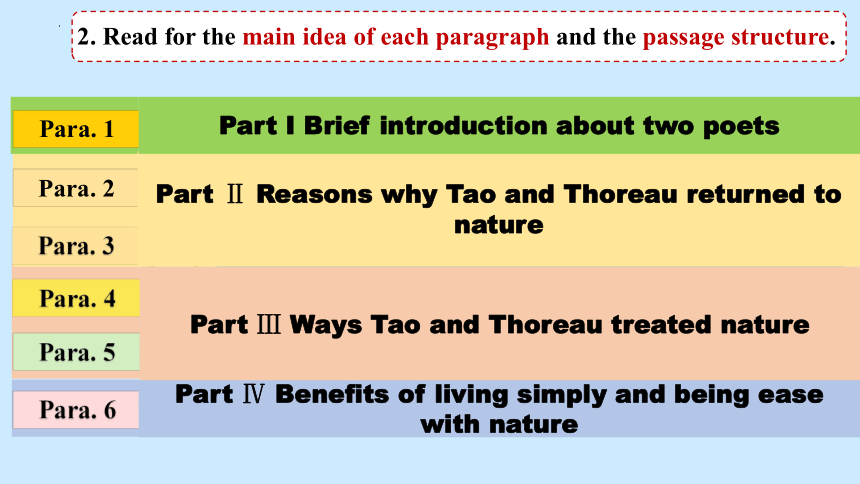
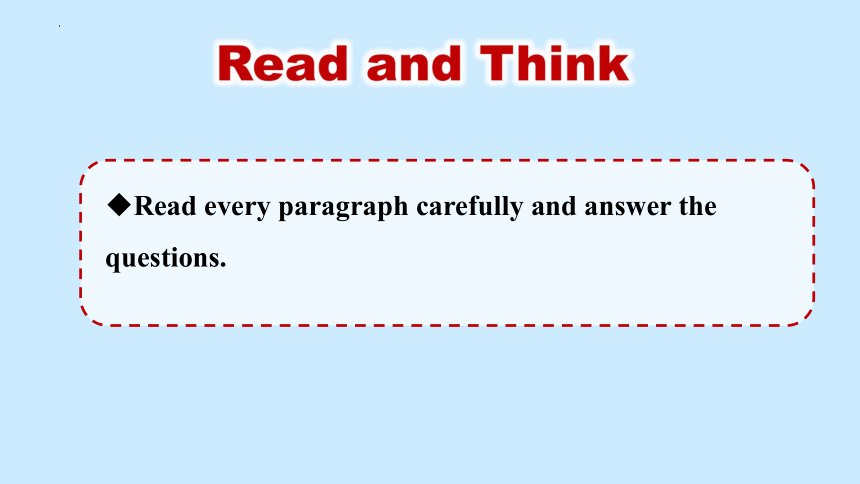
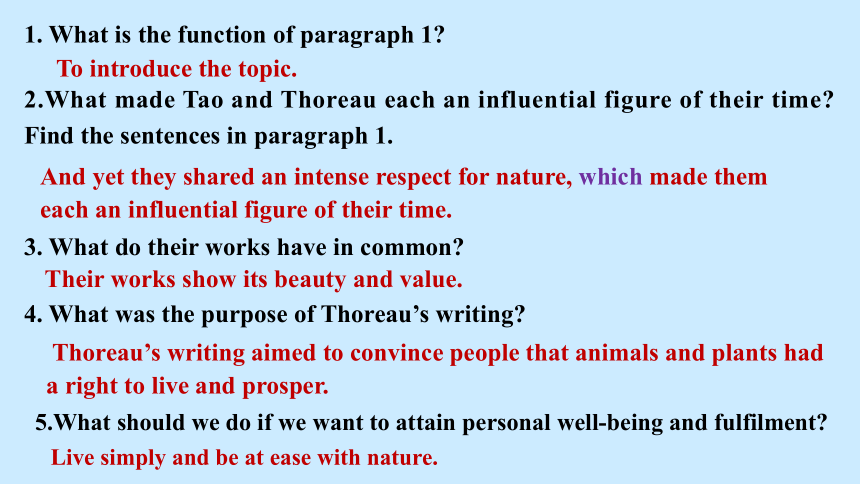
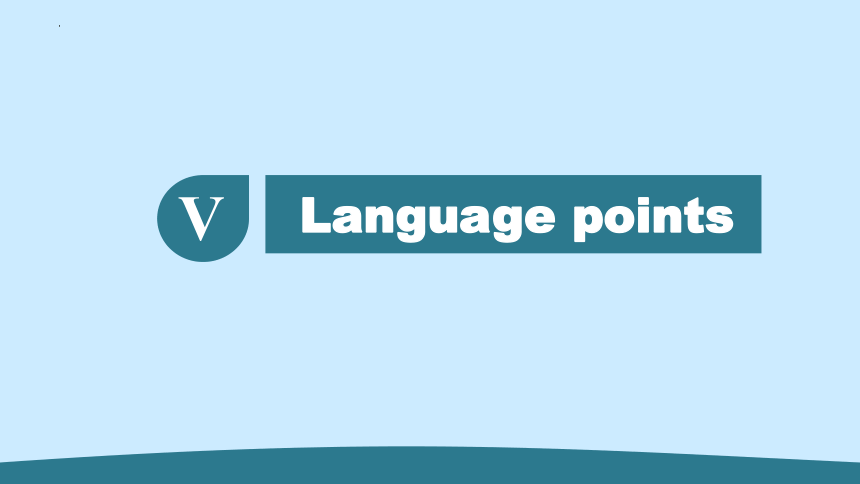
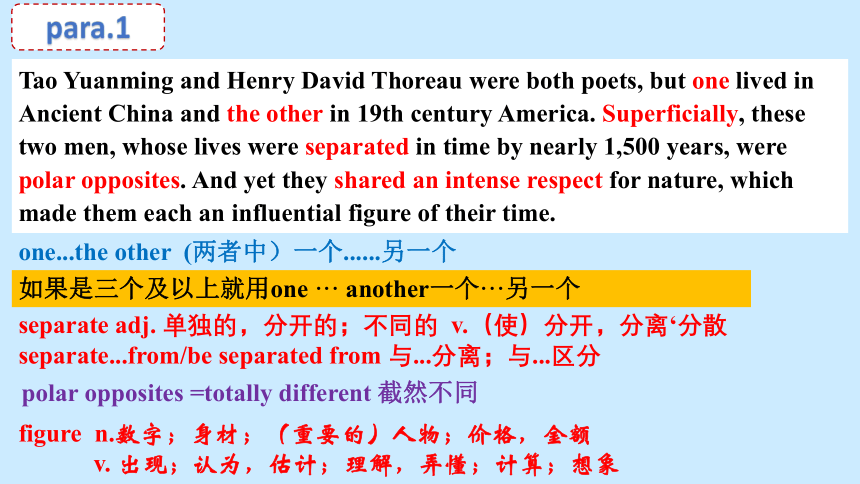
文档简介
(共22张PPT)
Unit 5 Learning from nature
Developing ideas — reading
Read the short introductions to Tao Yuanming and Henry David Thoreau and answer the question.
Born into a poor aristocratic(贵族的) family in the Eastern Jin Dynasty, Tao Yuanming (365–427) was one of China’s greatest poets and a noted(著名的) recluse (隐居者). A master of the five-word line, Tao has been described as the first great “poet of fields and gardens”.
Henry David Thoreau (1817–1862) was an American essayist, poet, and philosopher. He began writing nature poetry in his early twenties, with poet Ralph Waldo Emerson as a mentor (导师) and friend. In 1845, he began his famous two-year stay at Walden Pond, which he wrote about in his masterwork, Walden.
Read the passage structure quickly and answer the questions.
Read and Think
√
1.What’s the main idea of the passage
A. Benefits of living close to nature.
B. History about Tao Yuanming and Henry David Thoreau.
C. Both Tao Yuanming and Henry David Thoreau’s love for nature.
D. The similarity of Tao Yuanming and Henry David Thoreau.
Read and Think
Para. 1
Para. 2
Para. 3
Para. 4
Para. 5
2. Read for the main idea of each paragraph and the passage structure.
a. The reason why Tao returned to nature.
b. Brief introduction about Tao Yuanming and Henry.
c. The way Tao treated nature.
d. Benefits of living simply and being at ease with nature.
e. The reason why Thoreau returned to nature.
f. The way Thoreau treated nature.
Para. 6
Part Ⅱ Reasons why Tao and Thoreau returned to nature
Part Ⅲ Ways Tao and Thoreau treated nature
Part Ⅳ Benefits of living simply and being ease with nature
Part I Brief introduction about two poets
Read every paragraph carefully and answer the questions.
Read and Think
2.What made Tao and Thoreau each an influential figure of their time Find the sentences in paragraph 1.
And yet they shared an intense respect for nature, which made them each an influential figure of their time.
1. What is the function of paragraph 1
To introduce the topic.
3. What do their works have in common
Their works show its beauty and value.
4. What was the purpose of Thoreau’s writing
Thoreau’s writing aimed to convince people that animals and plants had a right to live and prosper.
5.What should we do if we want to attain personal well-being and fulfilment
Live simply and be at ease with nature.
Language points
V
Tao Yuanming and Henry David Thoreau were both poets, but one lived in Ancient China and the other in 19th century America. Superficially, these two men, whose lives were separated in time by nearly 1,500 years, were polar opposites. And yet they shared an intense respect for nature, which made them each an influential figure of their time.
one...the other (两者中)一个......另一个
如果是三个及以上就用one ··· another一个···另一个
polar opposites =totally different 截然不同
para.1
separate adj. 单独的,分开的;不同的 v.(使)分开,分离‘分散
separate...from/be separated from 与...分离;与...区分
figure n.数字;身材;(重要的)人物;价格,金额
v. 出现;认为,估计;理解,弄懂;计算;想象
Both men made dramatic transformations to their lives in order to reconnect with nature. As an official in the Eastern Jin Dynasty, Tao felt conflicted over life at court. In 405, he quit the service of the court for good, expressing his unhappiness in the now famous line that he would not “bow like a servant in return for five dou of grain”. He spent the next 22 years until his death, working the land in a poor, rural area. From his poetry, we can learn that although his life was arduous, he succeeded in finding contentment in its simplicity and in drawing pleasure from nature.
work the land 耕种
succeed in doing sth 成功做成某事
para.2
dramatically
drawing sth. from sth. 从...得到...
While Tao’s return to nature was a reaction to a lifestyle he was opposed to, Thoreau’s was a personal decision to transform the way he lived. He had a decent quality of life, but he wanted to live in a simpler way. For two years, two months and two days, he lived in a cottage in the forest on the edge of Walden Pond, focusing on himself and his writing. He explained his reason for doing so in Walden: “I went to the woods because I wished to live deliberately, to front only the essential facts of life.” Both men were happy to withdraw from contemporary life, seeking a harmonious relationship with nature in the quietness of their lives.
front 面对
withdraw from 从……退出
para.3
on/at the edge of 在...的边缘
was opposed to 名师p150
withdraw
(使)撤离;(使)退出
提取(存款等)
收回(发言、意见等)
脱离社会;不与人交往
n. withdrawal
写出下列句子中画线部分的汉语释义。
1. I’d like to withdraw some money from my account. ___________
2. The troops have been withdrawn from the danger area. __________
3. I want to withdraw a statement I made earlier. ___________
4. Britain has successfully withdrawn from the EU. ___________
提取
撤退
收回 / 撤回
退出
Although Tao and Thoreau do not treat nature in quite the same way, their works show its beauty and value. Tao’s nature is a place of fields and villages, in other words, rural, and his animals are domestic ones, such as chickens and dogs. The calm and peaceful life he wrote about is in contrast to and critical of the depressive court life:
Beyond the dark and distance lies a village,
The smoke above reluctant (不情愿的) to depart.
A dog is barking somewhere down the lane (小路),
And chickens sit atop the mulberry (桑葚) tree.
in contrast to 与……(形成)对比
be critical of 批评;批判
para.4
be reluctant to do sth 不愿做某事
in other words 换言之
criticize v. 批评,批判;评价,评论
criticism n. 批评,批判;指责;评论
critic n. 评论家;批评家
depart: to leave a place, especially to start a trip
part: if a person parts from another person, or two people part , they leave each other
depart/part
在空白处1个填入适当的单词。
1. I’ll ________ Washington for London tomorrow.
2. We ________ at the airport.
3. In the morning Mr McDonald _________from Sydney to London.
4.He has recently ________ from his wife.
depart
departed
parted
parted
depress
1) 将(某物)压下;推下;拉下
2) 使抑郁;使沮丧;使消沉
3) 使萧条;削弱
词汇拓展
depressed adj 抑郁的;沮丧的
depressing adj 令人沮丧的
depressive adj 患抑郁症的;抑郁的;压抑的; n [C] 抑郁症患者
depression n.沮丧;消沉;抑郁(症)
一、写出下列句子中画线部分的汉语释义。
1. The thought of taking the exam again depressed him. ____________
2. A war will depress the global economy. ___________
3. High interest rates may depress share prices. ____________
二、在空白处填入括号内单词的正确形式。
1. She felt very __________ (depress) about the future.
2. Looking for a job these days can be very __________ (depress).
3. The patient is suffering from __________ (depress).
4. Many people with a __________ (depress) illness never seek treatment.
Practice makes perfect!
使沮丧
使萧条
降低
depressed
depressing
depression
depressive
Thoreau’s descriptions of nature emphasised the beauty and purity of the wild areas around him. Devoting himself to observations of the natural phenomena, he recorded his detailed findings in his journals. Thoreau’s writing aimed to convince people that animals and plants had a right to live and prosper, as we do. We should live with them in harmony and enjoy nature’s gifts, as he describes in his journals:
Live in each season as it passes; breathe the
air, drink the drink, taste the fruit, and resign
yourself to the influences of each. Let them be
your only diet, drink and botanical medicines.
resign oneself to 听任
para.5
devote oneself to/be devoted to 致力于,专心于,献身于
(1) convince sb. (of)sth. 使某人相信某事
convince sb. to do sth. 说服某人做某事
convince sb. that 使某人确信
(2) convinced adj. 信服的;确信的
be convinced of/that .…. 相信;确信
(3) convincing adj. 令人信服的
convince v. 使确信,使相信;说服,劝说
After studying varieties of birds’ flying patterns, the man ____________ (convince) that it was high time that he should show everyone he could fly.
was convinced
It takes considerable courage to reject the easy and familiar and instead try to live closer to nature, as both Tao and Thoreau did. Their choices led them to quiet and reflective lives with fewer material desires. In today’s modern world, their ideas about living simply and being at ease with nature may take us a step closer to attaining personal well-being and fulfilment.
para.6
considerable
considerate adj.考虑周到的
adj.相当多(或大、重要等)的
considering prep. 鉴于; 考虑到 conj. 就 ... 而言
at ease with 不拘束;放松
with ease 轻易地,毫不费力地
feel/look at ease 感到/看上去心情放松
put sb. at (one's) ease 使某人放松
take one's ease 休息,放松一下
特别提示: ease作名词“容易,轻易”讲时,形容词是easy;作动词“宽慰;减轻;缓解”讲时,可用relieve替换!
ease the pain / stress / burden
我轻而易举地回答了这个问题。___________________________
Now he can put his mind ____ ease because he has passed the examination _____ ease.
at
with
I answered the question easily/with ease.
ease的其他搭配(名师p151)
1 for good
2 in return for ...
3 succeed in doing sth
4 reaction to ...
5 be opposed to ...
6 withdraw from ...
7 focus on
8 in contrast to
9 resign oneself to
10 at ease with
11 be critical of
Review some phrases
永久地;一劳永逸地
作为……的回报
成功做某事
对……做出反应
反对……
从……提取 / 离开 / 退出
专注于
与……(形成)对比
听从于;顺从于
放松;不拘束
批评;批判
Thank you!
Unit 5 Learning from nature
Developing ideas — reading
Read the short introductions to Tao Yuanming and Henry David Thoreau and answer the question.
Born into a poor aristocratic(贵族的) family in the Eastern Jin Dynasty, Tao Yuanming (365–427) was one of China’s greatest poets and a noted(著名的) recluse (隐居者). A master of the five-word line, Tao has been described as the first great “poet of fields and gardens”.
Henry David Thoreau (1817–1862) was an American essayist, poet, and philosopher. He began writing nature poetry in his early twenties, with poet Ralph Waldo Emerson as a mentor (导师) and friend. In 1845, he began his famous two-year stay at Walden Pond, which he wrote about in his masterwork, Walden.
Read the passage structure quickly and answer the questions.
Read and Think
√
1.What’s the main idea of the passage
A. Benefits of living close to nature.
B. History about Tao Yuanming and Henry David Thoreau.
C. Both Tao Yuanming and Henry David Thoreau’s love for nature.
D. The similarity of Tao Yuanming and Henry David Thoreau.
Read and Think
Para. 1
Para. 2
Para. 3
Para. 4
Para. 5
2. Read for the main idea of each paragraph and the passage structure.
a. The reason why Tao returned to nature.
b. Brief introduction about Tao Yuanming and Henry.
c. The way Tao treated nature.
d. Benefits of living simply and being at ease with nature.
e. The reason why Thoreau returned to nature.
f. The way Thoreau treated nature.
Para. 6
Part Ⅱ Reasons why Tao and Thoreau returned to nature
Part Ⅲ Ways Tao and Thoreau treated nature
Part Ⅳ Benefits of living simply and being ease with nature
Part I Brief introduction about two poets
Read every paragraph carefully and answer the questions.
Read and Think
2.What made Tao and Thoreau each an influential figure of their time Find the sentences in paragraph 1.
And yet they shared an intense respect for nature, which made them each an influential figure of their time.
1. What is the function of paragraph 1
To introduce the topic.
3. What do their works have in common
Their works show its beauty and value.
4. What was the purpose of Thoreau’s writing
Thoreau’s writing aimed to convince people that animals and plants had a right to live and prosper.
5.What should we do if we want to attain personal well-being and fulfilment
Live simply and be at ease with nature.
Language points
V
Tao Yuanming and Henry David Thoreau were both poets, but one lived in Ancient China and the other in 19th century America. Superficially, these two men, whose lives were separated in time by nearly 1,500 years, were polar opposites. And yet they shared an intense respect for nature, which made them each an influential figure of their time.
one...the other (两者中)一个......另一个
如果是三个及以上就用one ··· another一个···另一个
polar opposites =totally different 截然不同
para.1
separate adj. 单独的,分开的;不同的 v.(使)分开,分离‘分散
separate...from/be separated from 与...分离;与...区分
figure n.数字;身材;(重要的)人物;价格,金额
v. 出现;认为,估计;理解,弄懂;计算;想象
Both men made dramatic transformations to their lives in order to reconnect with nature. As an official in the Eastern Jin Dynasty, Tao felt conflicted over life at court. In 405, he quit the service of the court for good, expressing his unhappiness in the now famous line that he would not “bow like a servant in return for five dou of grain”. He spent the next 22 years until his death, working the land in a poor, rural area. From his poetry, we can learn that although his life was arduous, he succeeded in finding contentment in its simplicity and in drawing pleasure from nature.
work the land 耕种
succeed in doing sth 成功做成某事
para.2
dramatically
drawing sth. from sth. 从...得到...
While Tao’s return to nature was a reaction to a lifestyle he was opposed to, Thoreau’s was a personal decision to transform the way he lived. He had a decent quality of life, but he wanted to live in a simpler way. For two years, two months and two days, he lived in a cottage in the forest on the edge of Walden Pond, focusing on himself and his writing. He explained his reason for doing so in Walden: “I went to the woods because I wished to live deliberately, to front only the essential facts of life.” Both men were happy to withdraw from contemporary life, seeking a harmonious relationship with nature in the quietness of their lives.
front 面对
withdraw from 从……退出
para.3
on/at the edge of 在...的边缘
was opposed to 名师p150
withdraw
(使)撤离;(使)退出
提取(存款等)
收回(发言、意见等)
脱离社会;不与人交往
n. withdrawal
写出下列句子中画线部分的汉语释义。
1. I’d like to withdraw some money from my account. ___________
2. The troops have been withdrawn from the danger area. __________
3. I want to withdraw a statement I made earlier. ___________
4. Britain has successfully withdrawn from the EU. ___________
提取
撤退
收回 / 撤回
退出
Although Tao and Thoreau do not treat nature in quite the same way, their works show its beauty and value. Tao’s nature is a place of fields and villages, in other words, rural, and his animals are domestic ones, such as chickens and dogs. The calm and peaceful life he wrote about is in contrast to and critical of the depressive court life:
Beyond the dark and distance lies a village,
The smoke above reluctant (不情愿的) to depart.
A dog is barking somewhere down the lane (小路),
And chickens sit atop the mulberry (桑葚) tree.
in contrast to 与……(形成)对比
be critical of 批评;批判
para.4
be reluctant to do sth 不愿做某事
in other words 换言之
criticize v. 批评,批判;评价,评论
criticism n. 批评,批判;指责;评论
critic n. 评论家;批评家
depart: to leave a place, especially to start a trip
part: if a person parts from another person, or two people part , they leave each other
depart/part
在空白处1个填入适当的单词。
1. I’ll ________ Washington for London tomorrow.
2. We ________ at the airport.
3. In the morning Mr McDonald _________from Sydney to London.
4.He has recently ________ from his wife.
depart
departed
parted
parted
depress
1) 将(某物)压下;推下;拉下
2) 使抑郁;使沮丧;使消沉
3) 使萧条;削弱
词汇拓展
depressed adj 抑郁的;沮丧的
depressing adj 令人沮丧的
depressive adj 患抑郁症的;抑郁的;压抑的; n [C] 抑郁症患者
depression n.沮丧;消沉;抑郁(症)
一、写出下列句子中画线部分的汉语释义。
1. The thought of taking the exam again depressed him. ____________
2. A war will depress the global economy. ___________
3. High interest rates may depress share prices. ____________
二、在空白处填入括号内单词的正确形式。
1. She felt very __________ (depress) about the future.
2. Looking for a job these days can be very __________ (depress).
3. The patient is suffering from __________ (depress).
4. Many people with a __________ (depress) illness never seek treatment.
Practice makes perfect!
使沮丧
使萧条
降低
depressed
depressing
depression
depressive
Thoreau’s descriptions of nature emphasised the beauty and purity of the wild areas around him. Devoting himself to observations of the natural phenomena, he recorded his detailed findings in his journals. Thoreau’s writing aimed to convince people that animals and plants had a right to live and prosper, as we do. We should live with them in harmony and enjoy nature’s gifts, as he describes in his journals:
Live in each season as it passes; breathe the
air, drink the drink, taste the fruit, and resign
yourself to the influences of each. Let them be
your only diet, drink and botanical medicines.
resign oneself to 听任
para.5
devote oneself to/be devoted to 致力于,专心于,献身于
(1) convince sb. (of)sth. 使某人相信某事
convince sb. to do sth. 说服某人做某事
convince sb. that 使某人确信
(2) convinced adj. 信服的;确信的
be convinced of/that .…. 相信;确信
(3) convincing adj. 令人信服的
convince v. 使确信,使相信;说服,劝说
After studying varieties of birds’ flying patterns, the man ____________ (convince) that it was high time that he should show everyone he could fly.
was convinced
It takes considerable courage to reject the easy and familiar and instead try to live closer to nature, as both Tao and Thoreau did. Their choices led them to quiet and reflective lives with fewer material desires. In today’s modern world, their ideas about living simply and being at ease with nature may take us a step closer to attaining personal well-being and fulfilment.
para.6
considerable
considerate adj.考虑周到的
adj.相当多(或大、重要等)的
considering prep. 鉴于; 考虑到 conj. 就 ... 而言
at ease with 不拘束;放松
with ease 轻易地,毫不费力地
feel/look at ease 感到/看上去心情放松
put sb. at (one's) ease 使某人放松
take one's ease 休息,放松一下
特别提示: ease作名词“容易,轻易”讲时,形容词是easy;作动词“宽慰;减轻;缓解”讲时,可用relieve替换!
ease the pain / stress / burden
我轻而易举地回答了这个问题。___________________________
Now he can put his mind ____ ease because he has passed the examination _____ ease.
at
with
I answered the question easily/with ease.
ease的其他搭配(名师p151)
1 for good
2 in return for ...
3 succeed in doing sth
4 reaction to ...
5 be opposed to ...
6 withdraw from ...
7 focus on
8 in contrast to
9 resign oneself to
10 at ease with
11 be critical of
Review some phrases
永久地;一劳永逸地
作为……的回报
成功做某事
对……做出反应
反对……
从……提取 / 离开 / 退出
专注于
与……(形成)对比
听从于;顺从于
放松;不拘束
批评;批判
Thank you!
